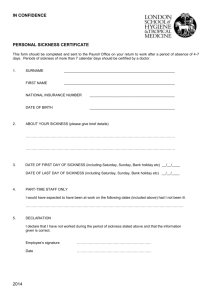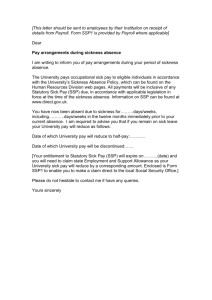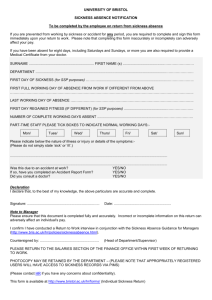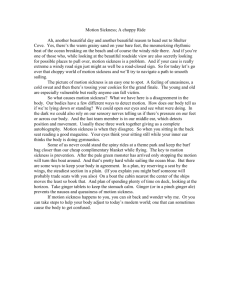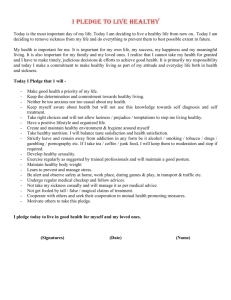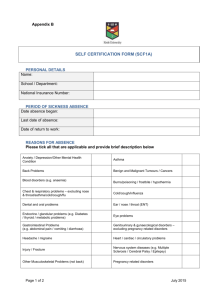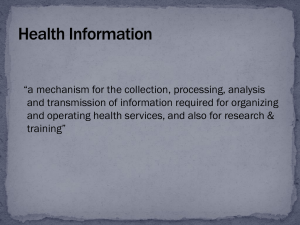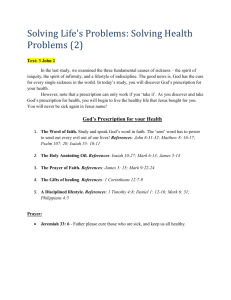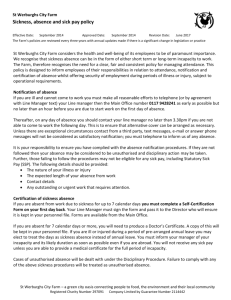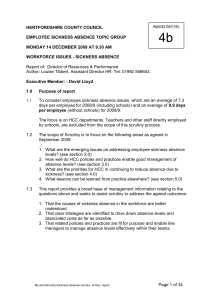February 2013 - Heath Street Baptist Church
advertisement
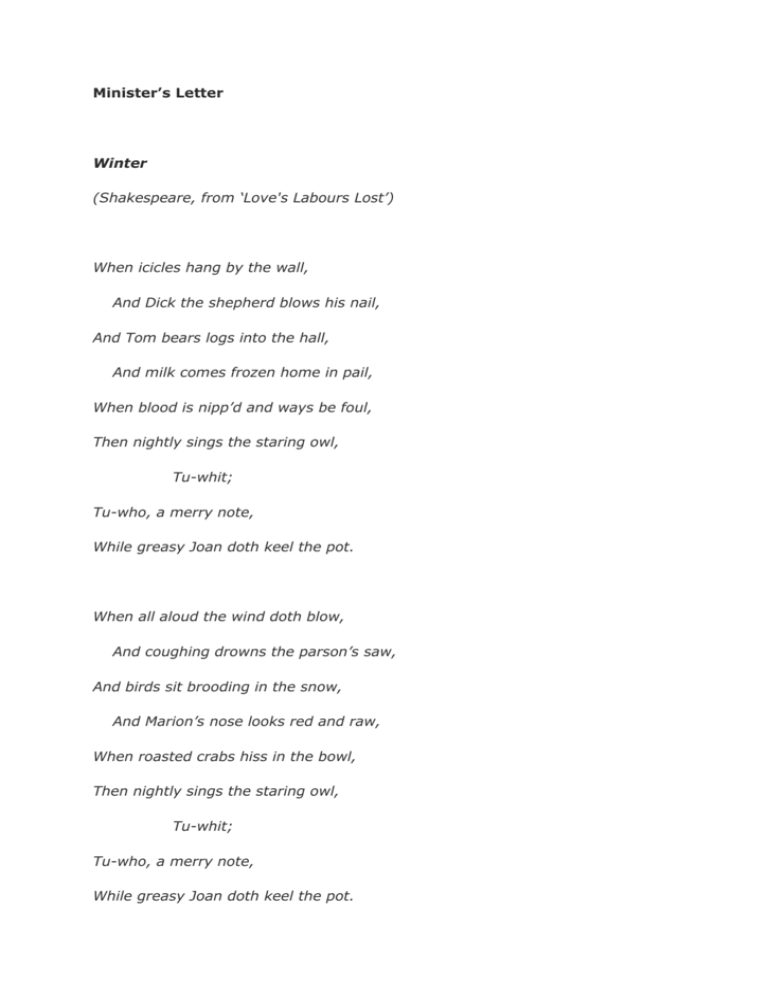
Minister’s Letter Winter (Shakespeare, from ‘Love's Labours Lost’) When icicles hang by the wall, And Dick the shepherd blows his nail, And Tom bears logs into the hall, And milk comes frozen home in pail, When blood is nipp’d and ways be foul, Then nightly sings the staring owl, Tu-whit; Tu-who, a merry note, While greasy Joan doth keel the pot. When all aloud the wind doth blow, And coughing drowns the parson’s saw, And birds sit brooding in the snow, And Marion’s nose looks red and raw, When roasted crabs hiss in the bowl, Then nightly sings the staring owl, Tu-whit; Tu-who, a merry note, While greasy Joan doth keel the pot. Matthew 10.42 “And whoever gives even a cup of cold water to one of these little ones in the name of a disciple—truly I tell you, none of these will lose their reward.” January has fully met its quotas, not only for ice and snow, but also for coughs, sneezes, and other more troublesome complaints. In our household as in others illness has been something of a running theme, and after a meeting of stomach bugs from several countries, one of my children set a new family record for the number of paper bags used in one flight. (Seven, apparently - regrettably I couldn’t be around to witness the remarkable achievement). It is striking how much, and how memorably, the Bible speaks about illness. “My bones are in agony”, moans the Psalmist; “there is no health in my body” he goes on; “my back is filled with searing pain” he points out. A good example of the importance of bodily experience in Scripture is the last item on the long list of Job’s sufferings. Having already lost his wealth, his status, his children and the good opinion of his spouse, Job’s misery is nevertheless not deemed complete without the loss of his health. Thankful my own share in January’s aches and pains was minor in the extreme. All the same, with the unpleasant memory of that little bout of sickness fresh in my mind, I think I can sense why the writers of the Old Testament found such a close connection between sickness and death. For them, the connection is not so much in the fact that sickness leads or might lead to death, as in the idea that sickness is already a part of death, a small dose of death as it were, that we receive in advance of actually dying. This is why we should not automatically think of the Christian doctrine of resurrection when the Psalmist speaks of being brought up from the grave: “O LORD, you have brought up my soul from Sheol; you restored me to life from among those who go down to the pit.” Rather the image here is of the underworld having made an incursion into our upper world, of the grave having staked a premature claim to the sick woman or man, which it is eventually forced to give up. ‘In the midst of life’ the Old Testament sees the sick person as quite literally ‘in death’, just as an embassy or consulate might be ‘in France’ or ‘in Germany’, despite being in the midst of London. Perhaps unsurprisingly, it seems that this way of looking at sickness only exacerbated the long-standing human tendency secretly or openly to despise the person who suffers from sicknesses. Both sickness and death came to be seen as a sign of God’s displeasure, and those who ought to care for the sick were sometimes only too quick to desert what they saw as a sinking ship. The book of Job is the most celebrated example of the spite and malice (only halfconscious) of bedside comfort at its worst. But Psalm 41 is perhaps even more colourful in its description of people who bring the Psalmist more than grapes and flowers: “My enemies say of me in malice, “When will he die and his name perish?”. When one of them comes to see me, he speaks falsely, while his heart gathers slander; then he goes out and spreads it around. All my enemies whisper together against me; they imagine the worst for me, saying, “A vile disease has afflicted him; he will never get up from the place where he lies.” Even my close friend, someone I trusted, one who shared my bread, has turned against me.” This ancient way of looking at sickness probably seems a long way away from the modern London of January blues, man-flu, and brightly lit hospitals. If we experience aches and pains, we’re more likely to say tell our friends that we’re going down to Boots than that we’re ‘going down to Sheol’. But there is much to be said for looking on even the most trivial of our diseases as a small shadow from the land of shadows. It’s said that our culturally is passionately afraid of confronting death. Certainly we are quick to silence ‘morbid’ thoughts and words. It is ‘no use’ talking about death, we say, as if our everyday conversation was usually regulated by the strictest concern for utility! But as Christians we have every reason to think and speak of death, and no reason to suppose that our thought and speech will therefore be morbid. We speak of death as the common enemy of humanity and of God. And whether we are speaking of the death that puts a last end to all our plans and projects, or of a little sickness that keeps us temporarily from our appointments, our work or our friends, we are speaking of something that puts a limit on the life God has given us. This brings us back to the resurrection, and the importance of not speaking of it too soon. The Christian hope of resurrection is dishonesty if it means an evasion of death. For Jesus Christ the resurrection came only after, and because of, the death he accepted on our behalf. In the same way we can only speak meaningfully of what God has done in Christ if we have the courage to face the pain, the sense of failure, and the fear that surround death. And where Christian communities are living out their calling they become known for the care they take not only of the dying and of the elderly, but also of the sick. I pray that Christ’s body here at Heath Street will be known for the care we take of our own, and of our community. The cup of cold water that comes with two paracetamol will surely find no less of a reward. Secretary’s news I am writing this with some snow still on the ground after our recent horribly cold few days. Christmas seems a long time ago but our jazz evening in midDecember, Waking from Sleep, must be mentioned as it was such a wonderful evening of music and poetry from a group of young musicians and singers, led by Ewan King, sharing their great gifts with us. Thanks to the volunteers who helped make it a good evening, including an enjoyable carol-singing session in the lower hall afterwards. We raised £250 for work in D. R. Congo. Everyone who attended loved it but the quality of the event deserved a bigger audience so we will ask your help next Christmas to fill the Church. It was good to hear from old friends at Christmas. Those who can get to Heath Street will find a lovely picture in the vestibule of our friends the Vivars, still in Vancouver. Katya will be graduating this summer after her degree studies in Psychology and Commerce. Mika is in her second year of a degree in BioChemistry. Those who remember the tiny girls attending Sunday School will still recognise their parents who haven’t changed at all! 2013 will not be a building-work-free period. Our kitchen committee (Annie, Susan and Theresa) are still working away at designing and specifying the new kitchen we need. What they are planning will make the lower floor much more useful. They hope that installation will start soon. We have a bit of a problem on the south side of the Church (nearest the tube station) where the metal walkway that our neighbouring schoolchildren use needs attention. We are working on plans now and hope to have the work done at latest by the Easter holidays. If you pass the church during the week you will see the doors open and lights on more than ever. We have groups singing or playing instruments in the evenings, running music sessions for small children some mornings, and a Hampstead community choir has started practising every Thursday. Chris Little, who helps us and St John at Hampstead and is living at the manse while he does so, is involved in several of these so do ask him about them on a Sunday morning. Chris is preaching his first ever sermon on the last Sunday in January at our Church-more about that next month…. With love and good wishes Gaynor Humphreys DAILY PRAYERS AND BIBLE READINGS January 28th – February 3rd Nehemiah 8.1-3, 5-6, 8-10 28th Thanksgiving for our homes 29th For children’s groups at Heath Street 30th For our justice system 31st Hildegard Williams 1st For migrants without papers in our city 2nd Ewan King 3rd We pray for contentment February 4th – 10th Ezekiel 43.27 – 44.4 4th Thanksgiving for hope 5th Joachim King 6th For the Church of England 7th The ministry of the Contact Club 8th Heini King 9th Marie Isaacs 10th February 11th – 17th 26th Gospel Oak We pray for the courage to love Jeremiah 17.5-10 The ministry and witness of St. Dominic’s church priory, 27th Susan LeQuesne 28th Helena Nawalkar 29th Godfray LeQuesne 30th Frida King 1st Chris Little 2nd Margaret Smith February 18rd – 24th Genesis 45.3-11,15 3rd Theresa Thom 4th Euan McLeod 5th Susan Brandt 6th Sylen Nawalkar 7th For our outreach activities 8th Robin Thorne 9th Henderson Court February 25th– March 3rd 10th Neil McLeod 11th Linda Savage Genesis 2.4b-9,15-25 12th Nesa Thorne 13th Annie Fang 14th Afi Kirk 15th Tom Brandt 16th David & Eleanor Neil CHURCH DATES February Saturday 2nd and art) All day Shhh… (all day festival of quiet music (http://thelocal.tv/listings/eventdetails/2-feb-13-shhhfestival-heath-street-baptist-church-hampstead/) Sunday 3rd 11am The Lord’s Supper WEEKLY ACTIVITIES Sundays Tuesdays 11am Divine Worship 8pm Contact Club 10am 4pm Thursdays 10am 7.30pm Oldtime Nursery Rhythm & Rhyme Orchestra Eeny Meeny Music Heath Street Choir Copy for the March Newsletter should reach Ewan King (ewan_king@mac.com) Not later than Wednesday 20th February
